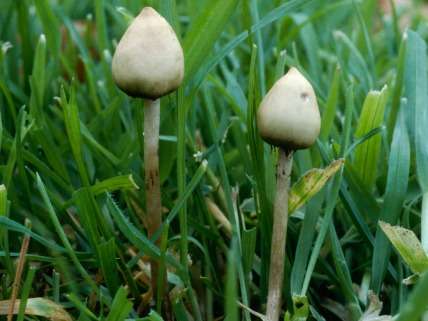Two New Studies Find Psilocybin Relieves Cancer Patients' Anxiety and Depression
A single dose of the banned psychedelic led to large and lasting psychological improvements.

Two studies published today in the journal Psychopharmacology indicate that a single dose of psilocybin, the main active ingredient in "magic mushrooms," has large and lasting effects on anxiety and depression in cancer patients. The research, which is consistent with earlier studies suggesting the psychological benefits of psilocybin and LSD for people who are gravely ill, is an important step in the medical and legal rehabilitation of a drug that has been banned since 1970.
Both studies used a randomized, double-blind, crossover design in which subjects either took psilocybin in the first session and a placebo in the second or vice versa. To help maintain the mystery of who got what when, both studies used active placebos: niacin in one case and a low dose of psilocybin in the other.
One study, conducted by researchers at New York University, involved 29 patients who received either psilocybin or niacin in conjunction with psychotherapy. "For each of the six primary outcome measures," NYU psychiatrist Stephen Ross and his co-authors report, "there were significant differences between the experimental and control groups (prior to the crossover at 7 weeks post-dose 1) with the psilocybin group (compared to the active control) demonstrating immediate, substantial, and sustained (up to 7 weeks post-dosing) clinical benefits in terms of reduction of anxiety and depression symptoms. The magnitude of differences between the psilocybin and control groups…was large across the primary outcome measures, assessed at 1 day/2 weeks/6 weeks/7 weeks post-dose 1."
These improvements persisted for at least six-and-a-half months after the psilocybin dose, when the final follow-up was completed. "Single moderate-dose psilocybin, in conjunction with psychotherapy, produced rapid, robust, and sustained clinical benefits in terms of reduction of anxiety and depression in patients with life-threatening cancer," Ross et al. write. "This pharmacological finding is novel in psychiatry in terms of a single dose of a medication leading to immediate anti-depressant and anxiolytic effects with enduring…clinical benefits." The researchers conclude that "the psilocybin-induced mystical experience mediated the anxiolytic and anti-depressant effects of psilocybin," since the intensity of that experience was correlated with the magnitude of the effects.
"It is unclear from the data whether the sustained benefits in clinical outcomes were due to psilocybin alone or some interactive effect of psilocybin plus the targeted psychotherapy," Ross et al. say. "Future research would be necessary to separate out the various therapeutic contributions of psilocybin versus psychotherapy." But the other psilocybin study reported in Psychopharmacology today, which was conducted by researchers at Johns Hopkins University and involved 51 cancer patients, shows that the psychedelic can have similar effects without psychotherapy.
Johns Hopkins psychiatrist Roland Griffiths and his colleagues used a design similar to the NUY study's (two sessions, one with a high dose of psilocybin and one with a very low dose) but skipped the psychotherapy. "When administered under psychologically supportive, double-blind conditions, a single dose of psilocybin produced substantial and enduring decreases in depressed mood and anxiety along with increases in quality of life and decreases in death anxiety in patients with a life-threatening cancer diagnosis," Griffiths et al. report. "Ratings by patients themselves, clinicians, and community observers suggested these effects endured at least 6 months. The overall rate of clinical response at 6 months on clinician-rated depression and anxiety was 78% and 83%, respectively."
These striking results inspired fear as well as hope. In an interview with The New York Times, William Breitbart, chairman of the psychiatry department at Memorial Sloan-Kettering Cancer Center, worried that improving the lives of cancer patients might be just the first step. "Medical marijuana got its foot in the door by making the appeal that 'cancer patients are suffering, they're near death, so for compassionate purposes, let's make it available,' " he said. "And then you're able to extend this drug to other purposes." Which would be terrible, right?
